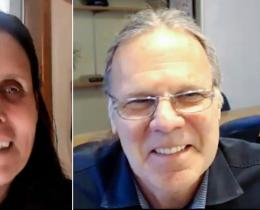Omega: You spent 15 years working as an analyst, portfolio manager, and client relations executive. How did that experience inspire you to rethink financial health and investment?
Manisha: It was two experiences. It was feeling like most of the financial industry was like fast food, having worked myself for some phenomenal places that were nutrient-rich but focused on corporations; and, it was wanting to help individual people have access to that nutrient-dense kind of financial information, including a handful of activities and pieces of advice that could really make a difference.
Omega: Financial needs and challenges can vary greatly at different stages of life. What is the most important financial advice you can give to a woman in her 20s? In her 40s? Her 60s?
Manisha: In your 20s, it's learning to live within your means—making sure that no matter what your income is you have something to set aside for savings, and that you are not carrying credit card debt. Make sure that your mortgage, car loan, and student loan are the only types of debt you carry.
If you’re not saving, it’s a sign that you’re not living within your means. For every year that you work, you need to fund a year of retirement. In an ideal world, you’d be saving 10, 15, 20 percent of your income.
In your 40s, the key is not to engage in lifestyle creep. As your income goes up, temptation escalates. It’s not always frivolous spending. Oftentimes it’s spending on kids. But your 40s is the time to really get serious about retirement, for saving to really kick in.
The related lesson is not to swing to the defensive. You don’t want to be super aggressive. You want to invest age-appropriately.
In your 60s, the biggest challenge is to be realistic about what retirement will look like for you, and realistic about how much you can afford to spend. Ideally, your retirement is composed of Social Security and your investment portfolio. You can pull out only about four percent of the portfolio a year.
Increasingly, I see parents in their 60s caught between elderly parents needing help and their kids’ needs. I encourage them to have the confidence to put themselves first, particularly women. We’re hard-wired to nurture and care for everyone else, and I want to give women in this stage permission to put their financial needs first.
Omega: Many couples face their most difficult challenges around finances, sometimes ending in divorce. How do you think people can strengthen their relationships, both financially as well as personally?
Manisha: The first thing is to commit to viewing money as something much bigger, as "financial well-being"—an aspect of well-being that you grow and nurture the way you would spiritual well-being, physical well-being, and intellectual well-being throughout your life.
Financial opposites tend to attract. Savers tend to be attracted to spenders and vice versa. In the courtship phase, there’s something intoxicating about financial otherness. But then after the initial attraction phase goes and your habits bubble up, you’re often butting heads.
Even if you're similar, the role that money plays in life is a highly personal message that runs in your mental operating system, and we don’t think about it or talk about it with each other. You meld lives and you might have two different sets of code that start to clash.
The idea is not to eliminate all stress or conflict or differences, because that’s not realistic. You can start with basic steps. Decide how you want to handle your finances from a couple’s standpoint: separate accounts, joint accounts, or both. Be transparent and honest about what you own and owe, and what you earn and spend. The most important thing is to get talking.
Omega: People often joke that talking about money makes them feel more vulnerable than talking about sex. One of your books is titled Get Financially Naked. What do you see as the relationship between risk and security in someone’s approach to finances?
Manisha: I definitely think people are more comfortable talking about sex than money! It’s my hope that ultimately people will feel more comfortable with their money narratives as well.
Risk and security are the financial equivalents of fear and love. It’s easy to think about risk as just one word, but there are three components to risk: your willingness, your ability, and your need.
- Willingness means your “sleep well at night” factor. Do you have a psychological predisposition toward taking risk or not?
- Ability is a function of your age and the stability of your income. If you are a very young tenured professor, you have a much higher capacity to take risk than a 70-year-old entrepreneur.
- The final piece is the real kicker, and that’s your need. You shouldn’t take more risk than you need. What’s the least amount of risk that you need to take on in order to get where you want to go?
Much of the financial world is geared toward getting us to take more risk because that’s where more fees are. In our culture we have a bias toward growing for growth’s sake, and you can see what that’s done to our environment. We have a predisposition to bigger being better, but sometimes more is not more. More is less. And it can be the same with risk.




